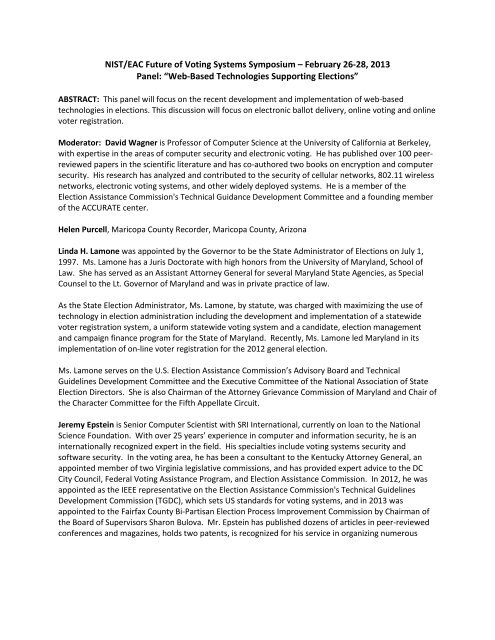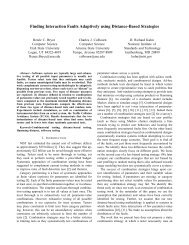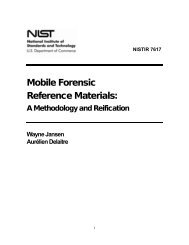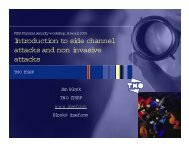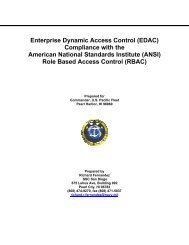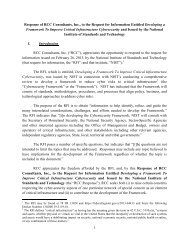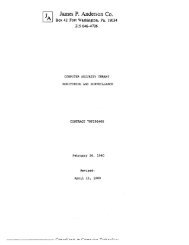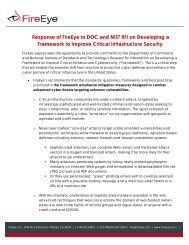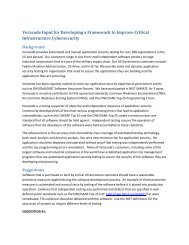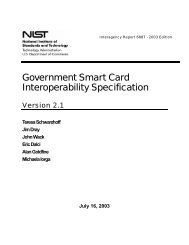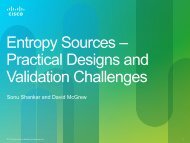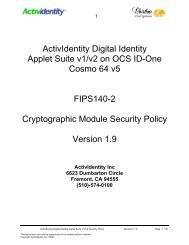Panel: “Web-Based Technologies Supporting Elections” - Computer ...
Panel: “Web-Based Technologies Supporting Elections” - Computer ...
Panel: “Web-Based Technologies Supporting Elections” - Computer ...
Create successful ePaper yourself
Turn your PDF publications into a flip-book with our unique Google optimized e-Paper software.
NIST/EAC Future of Voting Systems Symposium – February 26-28, 2013<br />
<strong>Panel</strong>: <strong>“Web</strong>-<strong>Based</strong> <strong>Technologies</strong> <strong>Supporting</strong> <strong>Elections”</strong><br />
ABSTRACT: This panel will focus on the recent development and implementation of web-based<br />
technologies in elections. This discussion will focus on electronic ballot delivery, online voting and online<br />
voter registration.<br />
Moderator: David Wagner is Professor of <strong>Computer</strong> Science at the University of California at Berkeley,<br />
with expertise in the areas of computer security and electronic voting. He has published over 100 peerreviewed<br />
papers in the scientific literature and has co-authored two books on encryption and computer<br />
security. His research has analyzed and contributed to the security of cellular networks, 802.11 wireless<br />
networks, electronic voting systems, and other widely deployed systems. He is a member of the<br />
Election Assistance Commission's Technical Guidance Development Committee and a founding member<br />
of the ACCURATE center.<br />
Helen Purcell, Maricopa County Recorder, Maricopa County, Arizona<br />
Linda H. Lamone was appointed by the Governor to be the State Administrator of Elections on July 1,<br />
1997. Ms. Lamone has a Juris Doctorate with high honors from the University of Maryland, School of<br />
Law. She has served as an Assistant Attorney General for several Maryland State Agencies, as Special<br />
Counsel to the Lt. Governor of Maryland and was in private practice of law.<br />
As the State Election Administrator, Ms. Lamone, by statute, was charged with maximizing the use of<br />
technology in election administration including the development and implementation of a statewide<br />
voter registration system, a uniform statewide voting system and a candidate, election management<br />
and campaign finance program for the State of Maryland. Recently, Ms. Lamone led Maryland in its<br />
implementation of on-line voter registration for the 2012 general election.<br />
Ms. Lamone serves on the U.S. Election Assistance Commission’s Advisory Board and Technical<br />
Guidelines Development Committee and the Executive Committee of the National Association of State<br />
Election Directors. She is also Chairman of the Attorney Grievance Commission of Maryland and Chair of<br />
the Character Committee for the Fifth Appellate Circuit.<br />
Jeremy Epstein is Senior <strong>Computer</strong> Scientist with SRI International, currently on loan to the National<br />
Science Foundation. With over 25 years’ experience in computer and information security, he is an<br />
internationally recognized expert in the field. His specialties include voting systems security and<br />
software security. In the voting area, he has been a consultant to the Kentucky Attorney General, an<br />
appointed member of two Virginia legislative commissions, and has provided expert advice to the DC<br />
City Council, Federal Voting Assistance Program, and Election Assistance Commission. In 2012, he was<br />
appointed as the IEEE representative on the Election Assistance Commission's Technical Guidelines<br />
Development Commission (TGDC), which sets US standards for voting systems, and in 2013 was<br />
appointed to the Fairfax County Bi-Partisan Election Process Improvement Commission by Chairman of<br />
the Board of Supervisors Sharon Bulova. Mr. Epstein has published dozens of articles in peer-reviewed<br />
conferences and magazines, holds two patents, is recognized for his service in organizing numerous
professional conferences, and is associate editor in chief of IEEE Security & Privacy magazine, the leading<br />
magazine in the field. Mr. Epstein was co-founder of Virginia Verified Voting, and is a member of the<br />
advisory board for Verified Voting Foundation, Inc. He holds an MS in <strong>Computer</strong> Sciences from Purdue<br />
University and completed all coursework for a PhD in Information Technology from George Mason<br />
University.<br />
Paul Lux, an Army veteran, came to the elections office in 1999, serving in various capacities until he<br />
was elected Supervisor of Elections in 2008. He has worked with the Federal Voting Assistance Program<br />
(FVAP), the US Election Assistance Commission (EAC), the National Institute of Standards and<br />
Technology (NIST), and the Florida Secretary of State and Division of Elections to improve voting<br />
processes and technological alternatives for military and overseas voters. He has been deeply involved<br />
in research to improve voting for absente military and overseas voters. He has participated in: the<br />
Voting Over the Internet (VOI) Project (2000), the Secure Electronic Voting and Registration Experiment<br />
(SERVE)(2004), the Okaloosa Distance Balloting Pilot (ODBP) Project (2008), and an electronic ballot<br />
delivery project (2010). Paul currently heads a consortium of 13 Florida Counties known collectively as<br />
Our Mission: Your Vote, a project being conducting under the EASE Grant from FVAP.


